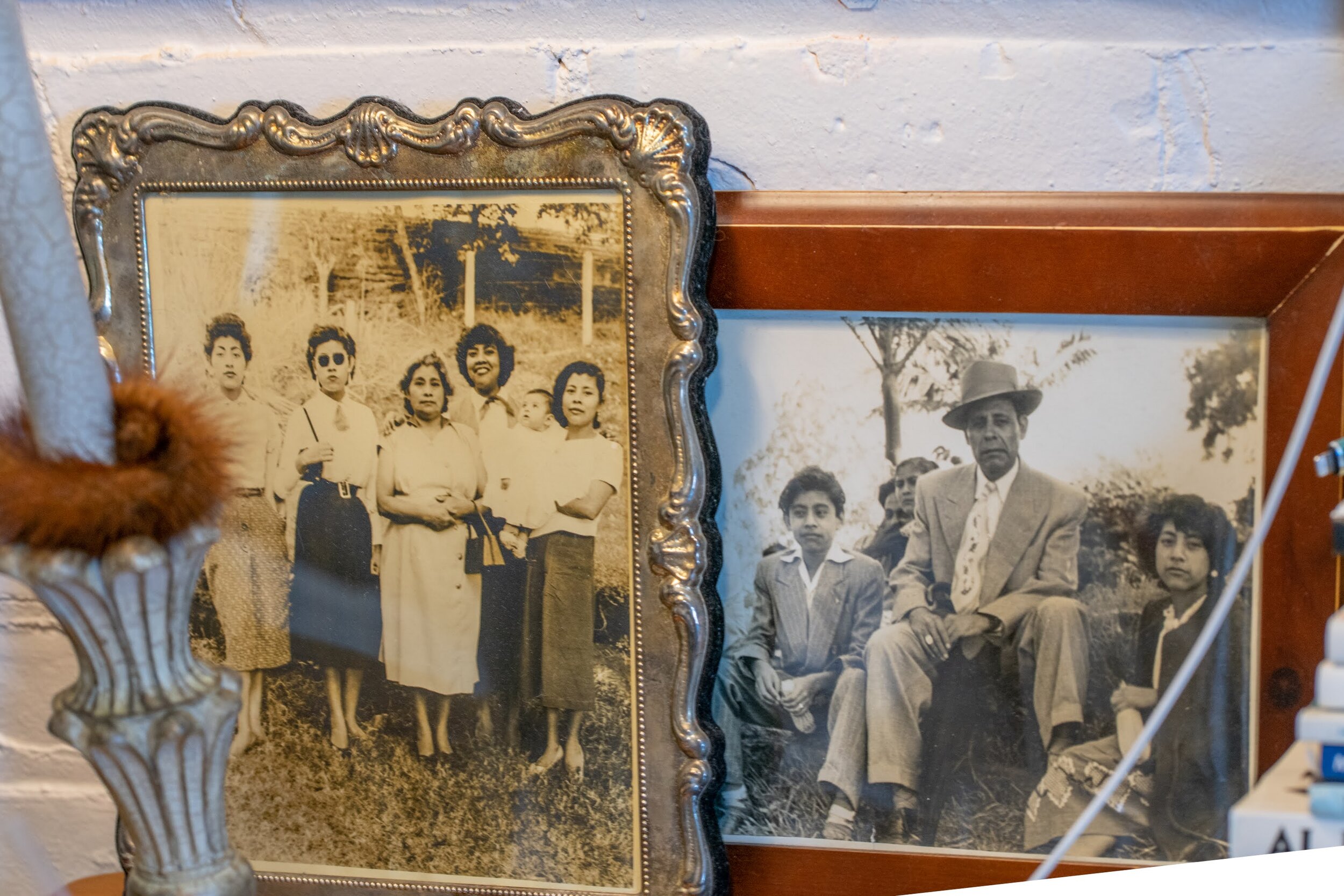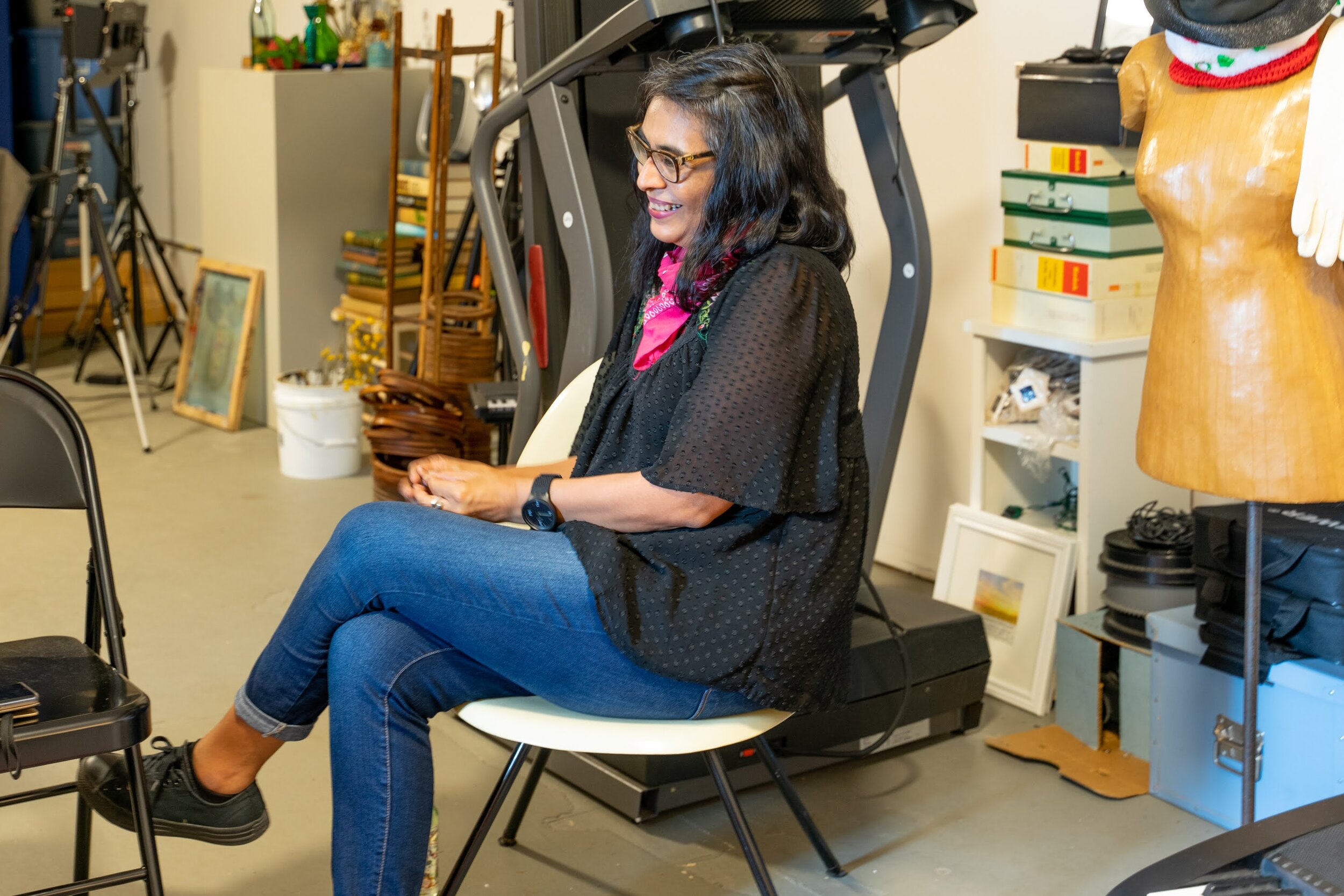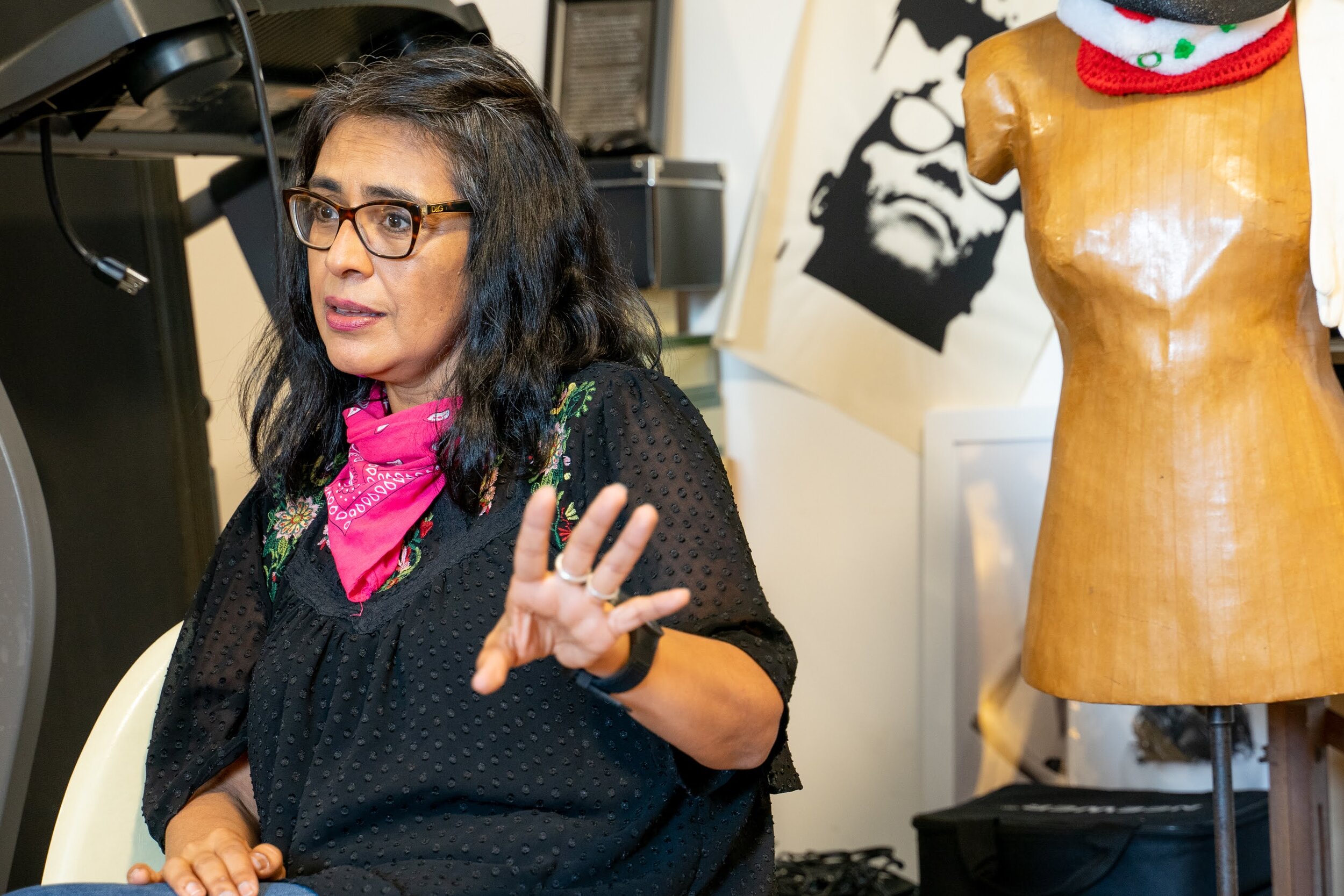Home Away from Home: Erika Nj Allen
Erika Nj Allen is a soft-spoken, beautiful soul from Guatemala. She’s been on my mind for the past two days as I ponder what to write for her introduction. Should I describe Erika’s studio, where everything has a purpose and a reason for being there? Should I describe her beautiful soul? Or maybe I should take a cue from her story and highlight how Erika came full circle over 30-plus years – all of it starting in Guatemala with a letter of invitation to a U.S. art school she couldn’t, at the time, accept.
As I mull on what to write, a TED talk – “What's Missing in the American Immigrant Narrative” – plays in my head. The 24-year-old speaker, Elizabeth Camarillo Gutierrez, gives a compelling narrative about how the American immigrant story is usually one of triumph. “Not so fast,” she cautions. We are quick to create a happy conclusion without thinking about the journey. A journey that is often filled with unspeakable agonies. A journey she advocates for more immigrants to share, so their tenacity and strengths can be appreciated more.
During those 30-plus years, Erika will cross international boundaries, start new careers, start new businesses, get married, have kids, move often, and divorce. In all that, the letter moved with her. She graduated from the Art Academy of Cincinnati in May 2020, 35 years after the idea was first planted.
Interview by Clara Matonhodze Strode. Photography by Emily Palm.
Erika, I'd like to start our discussion the same way I start the others, by asking who I am meeting today. Who is Erika at this moment?
I'm an artist that started late in life. I feel that there is no age to start doing what you love as long as you're having fun. You know that you're meant for certain things – for me, it's my art. I feel that I have so much that I have to accomplish because of the years that I wasted. They were not really lost years; I believe it was supposed to happen this way. It's happening now, so I have to go with it. There's no age to start doing what you love. I like to let my work have its own voice, so all these years were probably preparing for it.
That's such a great way of looking at it, and I believe the same things happen when they are supposed to happen. If it takes longer, it's because the universe is preparing us for it. So, while the world was preparing you for your destiny, what were you doing in the meantime?
I was married and had three kids. I was a housewife, so thankfully, I was able to stay home with the kids. However, I got divorced, and then I started hustling, trying to figure out what I am going to do. I decided to start my own business.
I had a full-time job for some time, but it was not what I wanted, so I started a commercial cleaning business with the little money I had saved. It was a very busy time – I would go for three days without sleep, switching between going to work and taking care of my kids at home. The business had immense potential, and I had a partner who dealt with the operations part of it. However, we soon sold that business, and I started my own that I ran for almost eight years. It was a good business because I could make a profit and take care of my kids. Then in 2008, the economy crumbled.
Oh, darn! You were on a roll there for a while. How did you survive in 2008?
At first, I thought I could make it work. With the business, it went from being paid late to not being paid at all. I had a payroll to meet. I started taking money out of savings to meet payroll, hoping things would turn around. As a single mom, I realized I couldn't continue to do that, so the business was no longer viable. However, my kids were also older, so I went to look for a job. I went from one job to another, and then, thankfully, I found one that I liked. But then, again, they laid us off. In hindsight, it was a good thing to happen because my husband [second marriage] said, "Well, you know you like photography, maybe you should pursue that." I did like photography. But I had never thought of pursuing it and wasn't quite sure how to start.
So what did you do?
Well, I always talked about going back to school to learn how to work my camera. It was a strange situation, but it worked – I made it work for me in that I decided to join the Art Academy full time. I fell in love with the building, the faculty, and everything about it. It started with a walk. I like to walk around and look at the murals in Cincinnati. There's one I liked, and when I researched the artist it was from, Kim Krause, he inspired me to reapply and meet with the dean of the Academy. I didn't know who they were, but after talking to Nick Potter, I took a tour of the Academy. During the tour, I learned that even though I was into photography, I could do other specializations as well. I like to be experimental, I want to try different things, so the deal was done.
I just graduated as part of the 2020 class. I was a non-traditional student, but it didn't matter because I already knew what I wanted. The faculty was so supportive and had a lot to do with my success.
That's amazing, Erika. That's coming full circle considering all these years you were carrying around a letter you received as a teenager inviting you to attend an art school in the U.S. You couldn't do it at that time, but here you are 30-plus years later, graduating from an art academy. How does that feel? Can you tell me more about the letter?
I was going through boxes, and I found the letter. When I was growing up in Guatemala, there was an opportunity for me to attend art school. Still, after looking at how much it would cost, I didn’t pursue it. Finding the letter was like, "Wow," because that was more than 30 years ago. It's just funny that I kept it because when I look around this room, everything you see here has some meaning.
We all have artifacts from our native homes that take on a larger than life significance when we get here – a blouse, a ring, a letter. You go back to them when you face adversity and try to remind yourself why you are here, so that artifact suddenly takes on a comforting role, the larger than life role in helping remind you why you left. Would you say this letter is it for you? What has that meaning for you?
Well, honestly, I didn't know that I was going to follow that passion. Back then, I just knew that I liked art, but maybe the universe already knew. I mean, I made a subconscious decision in Guatemala to pack the letter, so I'm sure that the universe was saying we have unfinished business on some level. I remembered the letter when my husband suggested pursuing art.
Tell me about growing up in Guatemala. What was it like? Did you have close family members?
Yes, recently I've been feeling sad about the passing of a dear cousin. We had kind of lost touch over the years – life, you know, but we had been trying to get back in touch. He was a famous artist, and he had told me that he was going to have a show in Brooklyn. So, I was trying to see if I could meet him there because he lived in Guatemala and Mexico. Strangely, I couldn't get hold of him; the next thing I knew, was a text from his wife that he had passed.
We used to hang around each other a lot before he got married and moved to Mexico. Everything I do now is in his memory because he was so talented. There are a few artists in my family, but it was not encouraged as a profession, so I really connected with him because we loved art.
I know where I come from, and I draw strength from that.
The other thing is I didn't grow up with my mom. She was working here in the U.S., and she made sure she sent money for me to go to private schools and get a good education. I actually did not even know her until my grandmother showed me a photo and said, "You see this woman? She's coming to visit. When you see her, you call her mother because that's your mom." I don't know much about my mom's history except she worked in the U.S.A. as a nanny. When she got pregnant, she didn't want to raise me here, so I was sent to Guatemala. She sent money to buy a house so my grandmother would not have to worry about rent.
Did you miss growing up with your mom?
Maybe, I don't know. I mean, how can you miss something that you don't have? I knew that she was my mom, but I didn't grow up with her. When I started going to the States, it was fun, but my aunt is the one who raised me. My mom definitely helped and made sure we were all taken care of. We have little problems like every other family, but my mom made it possible for me to be who I am now, and I'm very grateful.
What else do you remember? What made you happy?
Music. There was always music. My aunt was a dancer and one time started a dance school, so there was always music. I loved watching her dance and would help her a lot with preparing everything.
I also remember my visits to the U.S. to visit my mom in New Orleans. As a teenager, being able to say “I'm going on vacation in the U.S.A,” was fun. I would get here, and my mom would send me to school in New Orleans to keep learning English.
Was your coming to America inevitable because your mom was here, or was there something that pushed you away from Guatemala?
So this gets into the kind of stuff like the Me Too movement. I was a young woman and got into a relationship. The whole thing became very abusive to the point where if I didn't leave for good, I probably wouldn’t have made it. Everyone in my family wanted me to go, and it didn't help that he lived across the street from me. I couldn’t do anything without his approval, and at one point, he broke my nose. That really made me determined to move to the States and not go back.
That's very brave, Erika. I think I see some of that pain/trauma in your art, can you tell me what inspires your creativity?
I do everything by feeling. I need to have a relationship with my work. Last year, I had a hysterectomy, and going through it – the pain and the emotions – it was stressful for me. It was after the hysterectomy that we decided to add ceramics classes at the Welcome Project. I had never touched clay in my life before. Being able to sit there, listen to the teachers, and play with clay, it felt so nice. It happened that clay was the only thing I could do while recovering from the hysterectomy. I couldn't do photography. Also, I found it satisfying that I could see the result immediately – unlike film and photography. It was so therapeutic for me. I hated that the hysterectomy changed things for me. I remember making a piece with clay when it hit me; I can make a pineapple into something that is relatable to others, especially to my own experience. Like a pineapple, I felt like the hysterectomy had left a massive hole in my womb.
I didn't feel like I belonged. I didn't feel like the Erika that I knew. It was like looking at an alien when I looked in the mirror. My mind would tell me, "Erika, you have no friends. Nobody loves you," and that's the depression talking because you know you are loved, but you just went through an experience. Ceramics helped me overcome that because I poured it all into the art. I started making pieces of food and vegetables that were part of my diet. Just taking all those hours building pieces took away all those evil thoughts. Still, I didn't know that was happening until it was like I came out of this tunnel one day. I don't think I would have made it if I didn't have anything to remove all of that anguish and anger. That's why I let my work speak for itself.
Let's talk about the Welcome Project. The place you work and where some of your art is on display. How are things going?
Things are going okay. I was living in Covington, Kentucky when I heard about the Welcome Project. One day I sent them a message, and I was invited to stop by. I loved the mission, so I started volunteering since I had so much time on my hands. I wanted to keep myself busy, then Calcagno Cullen hired me to teach art classes for children whose mothers were working or creating there. I'm not a teacher, but I found a way that made it work, and it worked beautifully.
There's no age to start doing what you love.
At that time (circa 2016), things in Covington were changing. I used to run around Covington in peace, but I started to have insults thrown my way, so I was looking to move. Using my contacts from the Art Academy, I found a home in Camp Washington. All of it came together beautifully, both my home and work areas are in a place I love. It's easy for me to run the Welcome Project because of my history as an immigrant and my privilege as a Hispanic woman. The way that I came to the States allows me to help others who are probably not as fortunate. I want to use my privilege to help others within my community, and I know that's what Cal is doing – just helping out people who want to start a business in general.
We have many things planned for the future, including going to different communities and allowing those communities to have a space to be creative and feel safe. I think it's turned out great.
It seems, Erika, that you have genuinely found and created a home in Cincinnati. What do you reflect on? What are you most looking forward to?
My art and creating more ceramics, and seeing my kids and granddaughter be happy. I think about how far I have come. Breaking away from the mold and pursuing what I genuinely love. I had to. That's one thing that I would encourage others to do. I know where I come from, and I draw strength from that.
“Home Away from Home” is Clara Matonhodze Strode’s monthly column celebrating immigrant women who now call Cincinnati home. Nominate folks for Clara to interview here.







